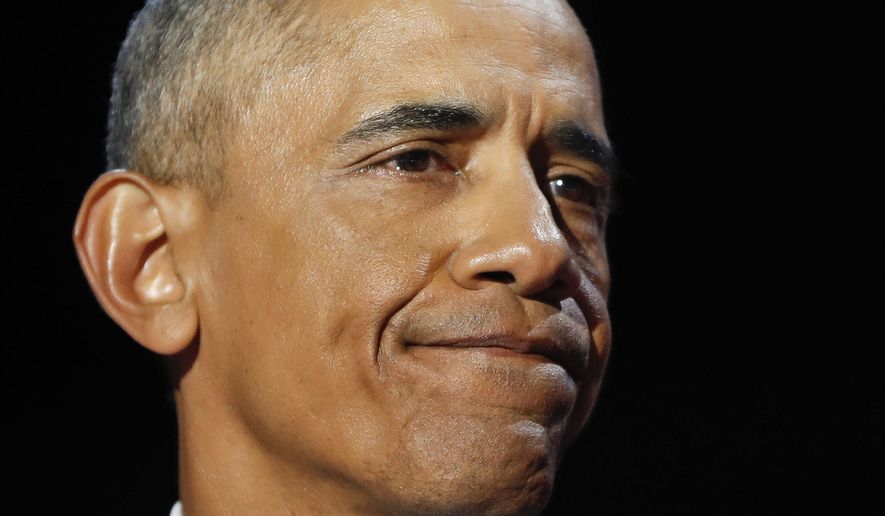Former President Barack Obama said Tuesday that President Trump made “a serious mistake” by pulling out of the Iran nuclear deal that Mr. Obama negotiated in 2015 as the supposed crowning achievement of his foreign policy.
The deal was not a treaty, largely because Mr. Obama knew that Congress would never ratify it. But that approach made it easier for Mr. Trump to nix the agreement Tuesday with the stroke of a pen.
Stung by Mr. Trump’s eviscerating of the deal that Mr. Obama considered the best hope for stabilizing the Middle East, the former president said the new administration is risking war in the region by encouraging Tehran to develop nuclear weapons soon.
“Walking away from the [Iran deal] turns our back on America’s closest allies, and an agreement that our country’s leading diplomats, scientists, and intelligence professionals negotiated,” Mr. Obama said in a lengthy statement. “The consistent flouting of agreements that our country is a party to risks eroding America’s credibility, and puts us at odds with the world’s major powers.”
Mr. Trump announced earlier Tuesday that he is withdrawing the U.S. from the deal because it hasn’t stopped Iran from sponsoring terrorism in the Middle East, and it won’t prevent Tehran from developing a nuclear weapon.
Mr. Obama and his top former advisers responded in unusually strong language that is rarely used by a president to criticize his successor.
Former Vice President Joseph R. Biden said Mr. Trump had made “a profound mistake.”
“President Trump has manufactured a crisis for his own political interests that puts us on a collision course not only with an adversary but also with our closest partners,” Mr. Biden said. “It is just the latest example of how President Trump’s notion of ’America First’ will leave America more alone and less secure.”
Former Secretary of State John F. Kerry, a key negotiator of the pact who drew the ire of Mr. Trump by engaging in secret talks with European leaders to salvage the deal, said Mr. Trump’s action “weakens our security, breaks America’s word, isolates us from our European allies, puts Israel at greater risk, empowers Iran’s hardliners, and reduces our global leverage to address Tehran’s misbehavior, while damaging the ability of future Administrations to make international agreements.”
“Instead of building an unprecedented nonproliferation verification measures, this decision risks throwing them away and dragging the world back to the brink we faced a few years ago,” Mr. Kerry tweeted. He said it will be up to America’s European allies to minimize “the damage” by trying to hold the nuclear agreement together.
“America should never have to outsource those stakes” to other countries, Mr. Kerry said.
The Obama administration engaged in long negotiations with Britain, France, Germany, China, Russia and Iran to reach the deal announced in 2015. Mr. Obama came in for heavy criticism when it was revealed that Iran received $1.7 billion in cash, flown to Tehran in a transport plane, as part of the deal that lifted economic sanctions in return for Iran giving up most of its nuclear enrichment capacity.
Mr. Obama said the nuclear deal “is working.”
“That is a view shared by our European allies, independent experts, and the current U.S. Secretary of Defense,” the former president said. “It has significantly rolled back Iran’s nuclear program.”
He called the agreement “a model for what diplomacy can accomplish.”
“Its inspections and verification regime is precisely what the United States should be working to put in place with North Korea,” he said. “Indeed, at a time when we are all rooting for diplomacy with North Korea to succeed, walking away from the [Iran deal] risks losing a deal that accomplishes – with Iran – the very outcome that we are pursuing with the North Koreans. That is why today’s announcement is so misguided.”
He said since the Iran deal was implemented, Tehran has destroyed the core of a reactor that could have produced weapons-grade plutonium; removed two-thirds of its centrifuges and placed them under international monitoring; and eliminated 97 percent of its stockpile of enriched uranium.
“The prohibition on Iran ever obtaining a nuclear weapon is permanent,” Mr. Obama said. “Even as some of the provisions in the [deal] do become less strict with time, this won’t happen until ten, fifteen, twenty, or twenty-five years into the deal, so there is little reason to put those restrictions at risk today.”
He said the agreement “was never intended to solve all of our problems with Iran.”
“We were clear-eyed that Iran engages in destabilizing behavior – including support for terrorism, and threats toward Israel and its neighbors,” Mr. Obama said. “But that’s precisely why it was so important that we prevent Iran from obtaining a nuclear weapon. Every aspect of Iranian behavior that is troubling is far more dangerous if their nuclear program is unconstrained.”
Mr. Obama warned that the U.S. could eventually be left “with a losing choice between a nuclear-armed Iran or another war in the Middle East.”
“We all know the dangers of Iran obtaining a nuclear weapon,” he said. “It could embolden an already dangerous regime; threaten our friends with destruction; pose unacceptable dangers to America’s own security; and trigger an arms race in the world’s most dangerous region…we could be hastening the day when we are faced with the choice between living with that threat, or going to war to prevent it.”
• Dave Boyer can be reached at dboyer@washingtontimes.com.




Please read our comment policy before commenting.